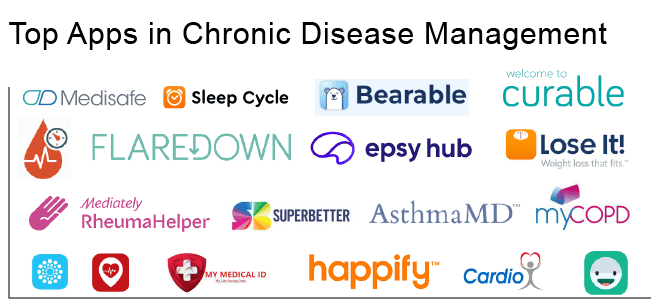Assessing the Growing Role & the Demand of Chronic Disease Management Apps
Jun 06, 2025
Over the past few years, the prevalence of chronic diseases has grown significantly, placing an increasing social and economic burden on individuals and families. Managing these long-lasting conditions requires constant attention to symptoms, medication, lifestyle changes, and emotional well-being. As a result, chronic disease management apps and chronic illness apps are playing an increasingly vital role in improving patient outcomes and quality of life. From chronic pain management to chronic illness symptom tracker apps, patients now have powerful digital tools to monitor symptoms, track progress, and manage care more effectively.
Despite advances in chronic disease management software and mobile health apps for chronic disease management, the global response to chronic illness remains inadequate, particularly in developing regions where financial and infrastructural limitations hinder access to care and innovation. Even in developed countries, gaps persist in personalized care and preventive strategies. Fortunately, a growing number of patients and healthcare providers are embracing technology to bridge these gaps. Whether it’s using the best symptom tracker app for chronic illness, a sleep app to improve rest quality, a chronic pain tracker app, or autoimmune symptom tracker apps for complex conditions, mobile health solutions are transforming chronic care management.
As the demand for chronic health tracker tools and pacing apps for chronic illness rises, the market continues to innovate. Today, there is a wide array of options—whether someone needs an app for chronic pain, a chronic app for overall health management, or one of the best apps for chronic illness to support day-to-day living. These mobile health applications empower users to take control of their health and work more collaboratively with their healthcare teams, making them an indispensable part of the modern chronic disease apps ecosystem.
Downloads
Click Here To Get the Article in PDF
Recent Articles
- Johnson & Johnson Acquires V-Wave; CalmiGo Launches Anxiety-Management Platform CalmiGo Plus;...
- Orthofix Launched WaveForm A; BD Entered into Agreement with STERIS; Surmodics’s SurVeil™ Drug-Co...
- Obesity: A Worldwide Pandemic with Advancing Management Options
- How Bariatric Surgery Devices Are Revolutionizing Weight Loss Outcomes?
- Aerin Medical’s RhinAer Stylus; CE Mark for Haemonetics’s VASCADE Vascular Closure Device; J&...
Growing Burden of Chronic Disease
In the US, more than 630,000 people die each year from heart disease, followed closely by cancer, which claims around 600,000 lives annually. According to the American College of Cardiology, poor dietary factors contributed to 22.4% of male deaths and 20.7% of female deaths in 2015 alone. Alongside these, obesity—a major chronic disease—continues to surge globally. Obesity-associated illnesses are escalating not just in the US but worldwide.
Factors such as an aging population, demanding lifestyles, and rising tobacco and alcohol consumption are driving the increase in long-term health issues. Additionally, rapid urbanization, physical inactivity, unhealthy diets, and sedentary behavior are fueling chronic conditions like obesity, diabetes, arthritis, cancer, and tooth decay. Many individuals face multimorbidity, managing two or more chronic illnesses simultaneously. In fact, 6 in 10 US adults have a chronic disease, while 4 in 10 live with multiple chronic conditions.
While various therapeutic approaches exist, they are often costly and time-consuming. In response, chronic disease management apps and chronic illness apps are emerging as key tools for helping individuals manage their health. These mobile health apps for chronic disease management allow users to track symptoms, monitor progress, and receive preventive insights—all from their smartphones. The best apps for chronic illness now integrate features like symptom tracking (chronic illness symptom tracker app), pacing for fatigue management (pacing apps for chronic illness), and even specialized chronic pain management apps and autoimmune symptom tracker apps.
This shift toward digital health solutions reflects a broader societal move toward mobile-first care. As chronic disease management software and chronic illness management apps continue to evolve, tech companies are investing heavily in developing smarter, more personalized tools, from chronic health tracker apps to advanced chronic pain tracker apps and sleep apps that support holistic well-being. As demand grows, these innovations are helping millions take proactive control of their health in ways never before possible.
Among various types of apps, the mobile app for mental health is one of the fastest-growing segments. As the mental health problem is growing, the mental health apps are also picking up pace. Similarly, the chronic illness tracker is the major use of mobile apps.
Top Mobile Health Apps for Managing Chronic Diseases:
Medisafe
Medisafe is one of the leading mobile health apps for medication management. Medisafe provides personalized, real-time reminders for each of the medications and vital drug interaction warnings. It is an easy-to-use app and comes with the feature to communicate with the Doctor. Overall, with its wide-ranging application, it truly empowers patients with chronic diseases or other diseases to seamlessly manage their treatment journey. The app has a user base of over 6 million and contains 30,000+ severe drug interaction warnings.
Sleep Cycle (Sleep Recorder)
Being unable to fall asleep and stay asleep is one of the major problems in today’s time. Sleep problems are quite common for adults with ADHD. To tackle sleep disorders, apps are available that can help to slow a racing brain, stay asleep, and wake up on time.
Sleep Cycle is an app that can track the sleep cycle and analyze the sleep of the user. It comes with an intelligent alarm clock that actively tracks sleep from bedtime to morning and provides a detailed analysis including sleep patterns and total sleep time which makes waking up at the optimal moment.
Blood Pressure
The Blood Pressure app by MedClin is a useful app that measures and monitors the blood pressure systolic, diastolic, and pulse with interactive charts and graphs. It provides blood pressure reports in PDF format that the user can easily share with the doctor. It has an advantage over other apps in that it can check the blood pressure zone at different levels, such as Stage 1 and 2 Hypertension, Prehypertension, Normal, and Hypotension. Additionally, it collects vital information that can help to measure and track your progress over a period of time.
Curable
Curable is one of the leading apps in the pain management segment and uses a biopsychosocial approach. It provides evidence-based chronic pain lessons and uses a combination of pain science education and research-backed techniques. The curable app comes with a virtual pain coach named Clara, who, after analyzing the user’s queries, presents 5-20-minute exercises, like guided meditations and visualizations, and lessons that help the user to better manage his/her health.
Bearable
Bearable is a one-stop solution to track a variety of emotions, mental health, and the severity of symptoms such as pain, fatigue, and acute and chronic illness. It also provides valuable insights into the user’s mood, sleep, exercise, diet, and medication. It is a highly customizable app and delivers a unique solution to each user.
PainScale – Free Chronic Pain Tracker Diary
The PainScale is one of the most popular medical mobile apps for pain tracking that manages and scales pain and its symptoms. It delivers personalized pain management education to the users and is trusted by over 100,000 chronic pain patients globally. PainScale has over 800 organized articles, health tips, exercises, and information on pain meditation that helps patients to discover information about treatment options that may work for their condition.
Flaredown
Flaredown is a simple symptom tracking app and a community for chronic illness. It tracks all the illnesses or conditions, symptoms, treatments, and other factors in one place. The user needs to register their health condition daily and utilize the data for building weekly reports and sending a visual health history to the doctor. Additionally, it advises the user on the best affordable treatment.

Epsy Health
Epsy Health is an app designed to manage seizures, triggers, and medication. It is one of the leading apps for seizure tracking and aims to provide a better life to the people affected by epilepsy. The app helps to get reminders, log daily routine medications, and also track every other experience about the user’s condition. Currently, the app is being used by over 120k people.
FitNow
Obesity or being overweight is one of the leading chronic diseases in today’s time. In order to manage Obesity, several apps are available on the market today. Among them, FitNow is one of the leading apps that track weight loss. The app is designed to track your carb, macro, and calorie intake. To further smooth the fitness journey, it can sync with other smart wearable devices like Fitbit trackers, Misfit trackers, Garmin trackers, Withings scales, Google Fit, Healthkit, and more.
SuperBetter
SuperBetter is a Chronic Disease Management (CDM) App that helps improve mental health. If a person is feeling sad, fighting internal demons, or needs some encouragement, this app provides simple exercises that they may do anytime they need. Each activity is matched with a goal that they want to achieve and assists the person in taking modest steps toward accomplishing it. It also actively recognizes the individual’s accomplishments.
My NSCLC Manager
My NSCLC Manager, designed for people with Non-Small Cell Lung Cancer (NSCLC), contains a digital notebook for recording and saving crucial information between medical appointments, as well as the option to track daily symptoms and side effects such as tiredness, mood, and pain level. Charts allow the user to quickly examine their test results and daily symptoms, and a calendar tool allows them to keep track of treatment cycles and set reminders for themself. The individual can also access instructional resources and exchange information with their doctor ahead of time.
AsthmaMD
AsthmaMD allows users to keep a journal of their asthma activity, medicines, and triggers. The information is shown in a color graph that users may share with their clinicians. Furthermore, by agreeing to securely submit encrypted and anonymized data, such as severity, time, date, and location, to a Google-managed database, patients may assist researchers in studying trends in asthma attacks.
MyCOPD
MyCOPD is the most comprehensive, user-friendly, and intuitive COPD app available for any device. myCOPD, designed and developed by COPD experts and externally peer-reviewed by prominent NHS physicians, gives patients and their clinical teams unprecedented autonomy. The app provides complete online pulmonary rehabilitation programs from the convenience of your own home to receive the best COPD therapy available.
Propeller
Propeller is an FDA-approved technology that helps individuals understand and regulate their asthma symptoms. A small sensor attached to their inhaler transmits data to the Propeller smartphone app. The app collects data such as where and when the inhaler is used automatically. It also sends out reminders and gives a daily forecast of humidity, temperature, and air quality.
PulsePoint Respond
This app connects the user with CPR-trained community members who are ready to respond to a cardiac (or other) emergency minutes before responding units arrive. The app utilizes the user’s GPS to alert individuals in the local area who can intervene fast and save lives before EMS arrives. The app directs responders and directs them to the nearest automated external defibrillator. Aside from the “CPR needed” signal, the app may alert the user to other surrounding situations and events, with benefits such as keeping them and their family safe and avoiding morning commute gridlock.
My Medical ID
The My Medical ID Chronic Disease Management app is an excellent fundamental medical app to have on your smartphone. It allows the person to save all of their pertinent medical information, such as diseases, prescriptions, insurance information, and so on. The user may also set up medical reminders or join their community to interact with others.
Happify
Happify is a self-guided CDM app that encourages the person to connect with their thoughts and feelings by utilizing cognitive behavioral therapy (CBT) skills and positive psychology. Happify’s journals, activities, and learning “Tracks” are simple to administer and comprehend for those new to these techniques. It helps the individual through a guided evaluation to better understand their talents and how to use them.
Cardiio
Cardiio is a heart fitness app with pulse-reader technology that allows user to measure their heart rate via their fingers. The smartphone’s camera light reads the pulse using the camera on the back of the phone. The Cardiio app provides useful information about the resting heart rate, heart rate performance over time, and endurance. Furthermore, the app includes an interval training circuit that the user may do with their doctor’s permission to increase their statistics and aerobic abilities.
Daylio
Daylio can assist the individual in identifying the mood patterns sooner so that they can make the necessary modifications. The person may utilize images within the PIN-protected app to document their daily activities and moods, then watch the app generate figures and patterns to help them better understand their mood. Moreover, the reminders help to stay on track with the monitoring and journaling activity.
Key Benefits of App in Chronic Disease Management
Over the past few years, mobile health apps for chronic disease management and digital health tools have emerged as transformative solutions to tackle the growing burden of chronic diseases. From chronic illness tracker apps to chronic pain management apps and autoimmune symptom tracker apps, these innovations empower individuals to actively manage their health through self-monitoring, symptom tracking, and personalized insights.
One of the most impactful uses of these solutions is personal health tracking. Whether it’s through a chronic illness symptom tracker app, a chronic health tracker, or a sleep app, users can consistently monitor their conditions and receive actionable feedback. Many of the best apps for chronic illness and chronic disease also offer education modules and coaching features that enhance long-term disease management.
Faster access to care is another key benefit. With smartphones and digital health tools, users can securely message providers, schedule virtual appointments, and access 24/7 support, streamlining care pathways and improving outcomes. Additionally, chronic disease management apps support medication adherence with automated medication and refill reminders, critical for chronic conditions requiring regular therapy.
As lifestyles become busier, maintaining consistent communication with healthcare professionals is often difficult. However, remote patient monitoring powered by chronic illness management apps and chronic disease management software bridges this gap. Patients can easily share health data in real time, allowing for dynamic care adjustments. Tools like chronic pain apps, pacing apps for chronic illness, and chronic pain tracker apps are proving especially valuable in this space.
With the global burden of chronic disease rising sharply, the demand for innovative chronic disease apps, digital health tools, and mobile health applications is expected to soar. As technology continues to advance, these solutions are poised to reshape how chronic conditions are managed, bringing healthcare closer to the patient than ever before.
Major Drawbacks of Chronic Diseases Apps
One issue that digital health applications have is that they are difficult to offer directly to patients, making them an unlikely source of paying clients. Given that people are not used to paying for chronic disease treatment other than conventional co-pays for doctor visits and prescription medications, the costs of gaining individual patients as clients are likely to be relatively expensive. Moreover, people do not regard chronic disease treatment as a leisure activity. In reality, Chronic Disease Management apps frequently impose a set of habits (like exercise and nutritional restrictions) that many people would prefer to avoid. Thus, potential users perceive Chronic Disease Management apps that monitor health issues and provide medical advice as something that the health care system — insurers or providers — should pay for. With very few patients ready to pay for digital technologies, health care businesses are the most likely source of income for app developers.
Furthermore, many people are concerned about their privacy and data security, and as a result, they are not trusting these CDM apps, which is also a major barrier to the CDM apps market growth. In addition, the accuracy of the CDM apps is also among the major issues faced by the app developers. The inaccurate data displayed by these apps remains a major concern for the patients and hinders the growth of the Chronic Disease Management apps market.
Future Perspective
As per estimates, in the United States, nearly 90% of annual healthcare expenditures are devoted to managing chronic and mental health conditions. Despite this significant investment, over half of Americans with chronic illnesses are affected by two or more conditions simultaneously. This makes it essential for chronic disease management (CDM) solutions to accommodate multiple conditions while integrating seamlessly with providers’ workflows and electronic medical record systems.
For patients, a well-designed chronic illness app must strike the right balance, offering helpful reminders and symptom tracking without overwhelming users. Successful chronic illness management apps evolve continuously, improving through user feedback. With each iteration, developers refine features, enhance usability, and broaden the app’s impact, whether it’s tracking symptoms, monitoring progress, or supporting adherence to treatment protocols.
To drive broader adoption, CDM tools must offer clear value, not only to patients but also to healthcare organizations and clinicians. Collaborating with stakeholders who see the benefits of such tools and can champion their integration into care pathways is critical. While many mobile health applications already provide essential capabilities for managing chronic diseases, institutional barriers to widespread adoption remain. Developers can improve the odds of success by addressing these challenges thoughtfully, focusing not just on app functionality but also on long-term engagement, usability, and seamless integration into clinical practice.
FAQs
With the rising prevalence of chronic conditions like diabetes, heart disease, and obesity, patients require continuous monitoring, symptom tracking, and support for lifestyle management. Chronic disease apps enable real-time health tracking, personalized insights, and improved adherence to treatment, helping patients take proactive control of their health.
The best chronic disease management apps integrate symptom tracking, medication reminders, pacing tools for fatigue, chronic pain monitoring, and mental health support. Many apps, such as Medisafe, Curable, and Bearable, also offer educational content, coaching features, and data-sharing capabilities with healthcare providers.
With 4 in 10 adults managing multiple chronic conditions, these apps consolidate tracking for various illnesses, allowing patients and clinicians to monitor overlapping symptoms, medication interactions, and progress in one unified platform, improving holistic care and outcomes.
Popular solutions include Medisafe for medication management, Sleep Cycle for sleep tracking, Curable for chronic pain, Bearable for symptom and mood tracking, FitNow for obesity management, MyCOPD for pulmonary rehabilitation, and Propeller for asthma management, among others.
Key challenges include data privacy concerns, skepticism over accuracy, reluctance to pay for digital health tools, and the need for seamless integration with clinical workflows. Users often expect healthcare providers or insurers to fund these apps rather than pay out-of-pocket.
Downloads
Article in PDF
Recent Articles
- 8 Emerging Obesity Trends Transforming Therapeutics Segment
- Body Contouring Devices: Understanding the Key Factors Determining the Market Growth and Evolving...
- Digital Twins in the Healthcare Industry
- ATS 2023 Updates: Dupixent – A Ray of Hope For Moderate To Severe Chronic Obstructive Pulmo...
- Opioid-Induced Respiratory Depression: Unveiling the Silent Threat



